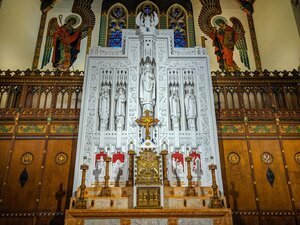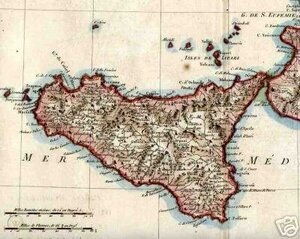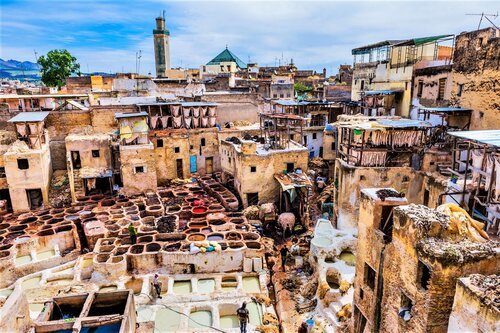As part of the growing Italian interest in North American writers of Italian descent, University of Rome Tor Vergata Professor Elisabetta Marino talks with Tony Ardizzone about his Moroccan short stories as well as his novels In the Garden of Papa Santuzzu and The Whale Chaser. They discuss how the plot of The Whale Chaser is complicated by la storia segreta, or "the secret history" of the internment of Italians and Italian Americans during the Second World War. This interview appeared in the online international literary journal Writers in Conversation, published by Flinders University, in Adelaide, South Australia.
One of the most delightful compliments a writer could receive was a phone call from Derek Alger to set up an interview. Here Alger discusses Tony Ardizzone's Chicago Roman Catholic roots (to the right is a photo of the imposing altar of Ardizzone’s childhood church, Saint Gregory the Great, where he served as an altar boy). Alger uncovers the story behind Ardizzone’s involvement with the "Champaign 39,” a group of professors, graduate students, and undergrads who were arrested and punished for their involvement in a peaceful antiwar sit-in at the University of Illinois. Ardizzone reveals how the arrests had a profound effect on the war protesters' lives.
In this interview in Il Regno/Magna Grece, an ethno-cultural journal for people of Southern Italian descent, Olivia Kate Cerrone and Tony Ardizzone discuss the theme of dislocation in his novels The Whale Chaser and In the Garden of Papa Santuzzu. Ardizzone reveals how his writing has been influenced by his study of ethnic American literature, and he and Cerrone talk about the racist theories put forward by the eugenicist Madison Grant in his 1916 book The Passing of the Great Race (which Hitler called "my Bible"), and how Grant’s argument that Italians and other Mediterraneans were 'racially unfit' influenced America's laws regulating immigration.
Shannon R. Wooden, professor and co-author of Pixar’s Boy Stories: Masculinity in a Postmodern Age, talks with Ardizzone about how his work participates in the larger context of cultural conversation. They discuss the motif of twins in Ardizzone’s work as well as the magical realism in In the Garden of Papa Santuzzu. Ardizzone relates a story about his mother and a living-room lamp that for months after his father’s death would turn on and off without being touched. After an analysis of interconnected story collections, they talk about the challenge of integrating a life of writing with the ongoing demands of work and family, including the particular pressures encountered by writers who make their living by teaching at universities.
Here Ardizzone discusses how his experiences in Morocco led to his writing In the Garden of Papa Santuzzu, acknowledging that several Moroccan beliefs are similar to those held by his family, who emigrated from Sicily's North African, or Arab, face. He talks about the roles folklore and religion play in his work, particularly in his chapter "The Black Madonna," in which the Virgin Mary appears to one of the book's characters. The interview was conducted by John King, author, academic, and host of The Drunken Odyssey: A Podcast About the Writing Life, and Numsiri Kunakemakorn, Professor of Secondary Education at Utah Valley University.






